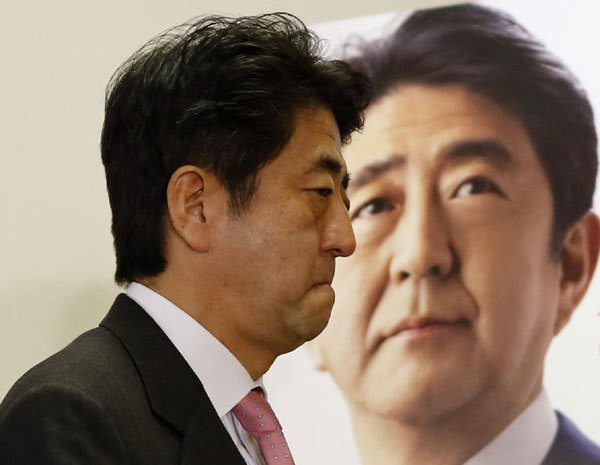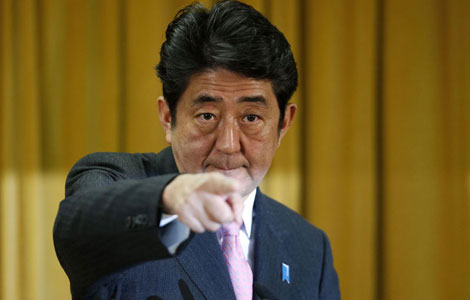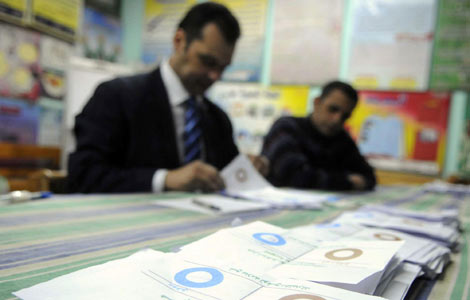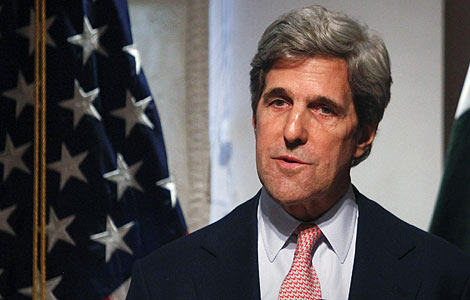
Japan moved to the right and unsettled the region, observers said, after the country's conservative opposition swept to victory in national polls on Sunday.
Analysts also said that Japanese politics are witnessing the shrinking of moderate and left-wing parties, while right-wing radical groups, including the new Japan Restoration Party, are gaining momentum.
 |
|
Japan's conservative Liberal Democratic Party's leader Shinzo Abe attends a news conference at the LDP headquarters in Tokyo on Monday. Toru Hanai / Reuters |
Voters dumped Prime Minister Yoshihiko Noda on Sunday, three years after his Democratic Party of Japan promised a change from more than half a century of almost unbroken rule by the Liberal Democratic Party.
LDP leader Shinzo Abe, 58, the presumptive next prime minister, is a conservative hawk who openly proposes revising the pacifist Constitution to bolster Japan's military capabilities.
Abe, whose 2006-07 first stint as prime minister ended ignominiously amid low popularity and scandals involving his ministers, has also vowed to strengthen Japan's alliance with the US, while standing up to China in a row over the sovereignty of China's Diaoyu Islands in the East China Sea.
Besides Abe, right-wing figures including nationalist former Tokyo governor Shintaro Ishihara, whose bid to "purchase" the islands at the center of the dispute with Beijing sparked months of tensions, secured a seat as leader of the third-largest party.
His Japan Restoration Party won between 46 and 61 seats, NHK television said, giving him enough clout to be heard from the parliamentary sidelines.
Hawkish Japanese politicians have been bolstering nationalistic sentiments during the election, with the Japan Restoration Party calling for a national security law that would restore the country's long-forbidden right to collective self-defense, and allow military action overseas, a major taboo for years.
The Republic of Korea called on Monday for Abe to make efforts to mend strained ties with its neighbors, Yonhap News Agency cited an unnamed senior official as saying, as the ROK responded cautiously to the victory of Abe, who is expected to keep a hawkish stance on territorial issues.
"Any action from Japan that runs counter to the correct understanding of history will have an adverse effect on relations with neighbors, including Korea and China and the image of Japan in the international community," the official said.
According to Huo Jiangang, an expert on Japanese studies at the China Institute of Contemporary International Relations, the Japanese believe their country is becoming weak and they want more confidence, so political parties play on those fears for more votes.
Feng Wei, an expert on Japanese studies at Fudan University in Shanghai, said the majority of the Japanese public has shown support for a hard-line stance on territorial issues, and Japan has long hoped to become a country with unrestricted defense forces, giving rise to the expanding right-wing parties.
"However, the radical Japan Restoration Party will not see a major growth of support in the future, as its partisans will further differ on policies, and friction will ensue," Feng said.
If the LDP establishes a new coalition government with its long-time ally, the pacifist New Komeito party, the new Cabinet should consider its policies regarding China instead of using the radical campaign platform, Lu Yaodong said.
The right-wing movement has also raised concern among observers in the West.
The BBC's Rupert Wingfield-Hayes said that as many predicted, Japan has taken a sharp turn to the right.
Kathryn Ibata-Arens, who serves on the bilateral US-Japan Innovation and Entrepreneurship Council and is an associate professor at DePaul University in Chicago, wrote on the Daily Beast website, "What should really cause concern is that Ishihara and his ilk are gaining popularity within the Japanese electorate, including a young generation of disenfranchised men".
AFP contributed to this story.
zhangyunbi@chinadaily.com.cn







